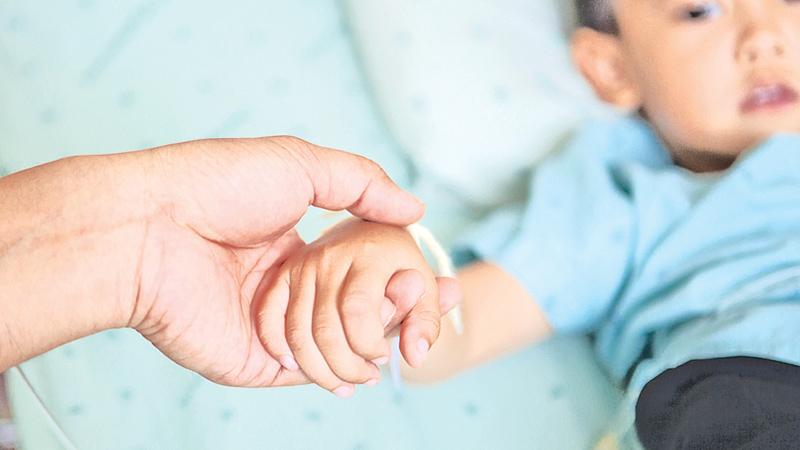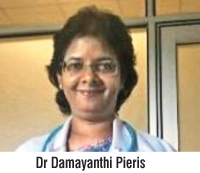
As cancer cases mount worldwide due to better detection and more reporting, the number of fatalities has dropped significantly due to more effective treatment methods. This applies to Sri Lanka as well, where most hospitals have reported an increase in the number of patients visiting their out patient departments for screening of cancer. A disturbing aspect however, is that despite several inputs by the Health Ministry, many people are still unaware or delay to report symptoms of cancer, until the disease has advanced to a stage when treatment becomes complicated.
 In this respect, the most vulnerable victims are children, for whom any delay in treatment could lead to fatal results due to the low immune systems in their still maturing bodies.
In this respect, the most vulnerable victims are children, for whom any delay in treatment could lead to fatal results due to the low immune systems in their still maturing bodies.
In Sri Lanka, although paediatric cancer cases are rare, authorities admit that the numbers are growing. At the premier Cancer Institute in Maharagama, it is reported that the annual new patient load is around 650 while out patient clinics see around 100 paediatric cancer cases a day.
While the causes for childhood cancer are many, the tragedy is that some of them start with unhealthy diets such as fast foods, which could result in children under 18 years to develop illnesses that could eventually lead to early cancer.
How can childhood cancer be prevented? Given the new advances we have made in detection and treatment, can Sri Lanka become a cancer free country in the near future?
President, Sri Lanka College of Oncologists, Senior Consultant in Clinical Oncology, National Institute of Cancer, Maharagama, Dr Damayanthi Pieris draws from her long experience in the field, as she responds to our questions in this interview with the Sunday Observer.
Excerpts…
Q. It has been reported that cancer in young children including babies is on the rise in Sri Lanka. Is this true? If so why?
A. There is a rise in numbers. But, a rise in numbers does not mean that the incidence is going up. The main reason is that our population is increasing, resulting in an increase in the number of cancers, and the fact that people live longer.
In addition, cancer detection is also better today with all the inputs we have put in place. People are more aware of the disease due to the awareness raising programs islandwide, by both the government and non governmental sectors. Hence, more cases are reported. So as I mentioned earlier, rising number does not mean incidence is going up.
Q. Any statistics on recent surveys in this regard?
A. The cancer incidence data 2006- 2010 will give a good indication.
Q. Is cancer in children an emerging trend in Sri Lanka? What was it like around three decades ago? Did you have a similar number of cases?
A. No, it is not a trend. Worldwide, cancer in children is of the same pattern. It is only when there are cancer survivors that people become aware of cancer.
Q. Was it the same in the past?
A. Three decades ago there were few numbers because diagnosis was difficult and survivors then were few. Nowadays, there are many survivors of childhood cancers because of the advanced techniques and the knowledge on detecting symptoms at an early stage.
Q. What are the main causes why children are vulnerable to cancer? What is the age category in children, most at risk?
A. Children develop cancers mostly due to some genetic problem in their body. But, cancer is a disease that can affect anyone irrespective of age. Even at birth some cancers are found in newborn babies.
Q. Are the types of cancers the same in the different age groups?
A. No, it differs in each age group…
Q. Are genes a contributory factor? Can a baby for example, inherit cancer if his family has a history of cancer?
A. Genes have a definite contributory role in paediatric cancers. However, it is not always that the gene passes down to the next generation..
There are only a few cancers that come through genes to the next generation. In the majority of cases, there is either a mutation or translocation of a chromosome that happened during the cell division at the embryo stage.
Q. Similarly, can an adult or young teenager get cancer early, due to the same reason?
A. Yes. But very few adult cancers are familial. They are more likely due to environmental factors.
Since children up to18 years are also included in the paediatric age group, teenagers also fall within the same age range.
Q. What is the risk of a newborn baby contracting the disease from his nursing mother, who is a cancer victim?
A. There is no risk to the baby or anyone else as cancer is a non-communicable disease.
Q. Can diet, such as, eating unhealthy fast foods especially, by school going children and adolescents make them more vulnerable to cancer? What sort of foods put them most at risk? What are the foods (local) that carry the least risks?
A. Unhealthy food habits in a child will lead to bad health in adulthood which may lead to certain adult cancers; one example is Colon cancer. All processed food, preservative added food, food with high fat content or red meat etc, are unhealthy food. In my opinion, the local average Sri Lankan food is quite healthy provided one does not overeat.
Q. Since our focus is on paediatric cancer, tell us if more young male children are at risk of getting cancer than female children? If so what are the organs affected in 1) males 2) the girl child?
A. There is no gender discrepancy.
Q. Can cancer in children be prevented? How?
A. It is not preventable as we cannot manipulate genes. But, early detection and proper treatment will save lives.
Q. What are the symptoms to look for, to detect cancer in children ? What kind of cancers usually affect children, girls and boys? E.g. when oestrogen glands are in excess, etc, in girls?
A. Most cancer symptoms are general, like fevers, fatigue, back ache, headache, lymphadenopathy etc. These have to be differentiated by doctors. There can be unusual lumps, squints in the eye, white pupil in the eye, lumps and pain in limbs etc, which are very specific and must be treated early.
Q. In the case of newborn babies and infants what are the symptoms to look for?
A. Any symptom which is unusual to the child will have to be sorted out by the paediatrician.
Q. What is the usual procedure followed at the Maharagama Hospital when a child is brought with suspicious symptoms of cancer?
A. We receive only referrals from paediatricians. The paediatrician who sees the child first will refer the child to Maharagama, if needed.
Q. What happens if the child is below one year?
A. The same procedure is followed. We accommodate them in our wards and treat them.
Q. If detected early, will treatment in the case of children be for life? Or can they be cured?
A. Treatment depends on the type of cancer and extent. It is not a life long process. Most can be cured.
Q. How effective are the drugs now available for children with cancer? How are they administered?
A. They are very effective drugs. Most are administered intra venous, some are given orally.
Q. At what stage does a child have to undergo chemotherapy or radiation?
A. Chemotherapy can be given at any age or stage. Surgery is the other form of treatment and age is not a barrier. However, we try to avoid Radiotherapy in very young children.
Q. Can a child resume his normal life and go back to school, take part in sports etc when he is on treatment?
A. Once the intensive phase is over they can attend school, participate in sports etc, after treatment is over.
Q. At present how many children with cancer are being treated at Maharagama?
A. Our annual new patient load is around 650. We have 100 beds and our out patient clinics see around 100 a day.
Q.In cases where children live far away, does the hospital have special wards to keep them till they complete the treatment course? Have these wards enough beds for them?
Is there accommodation for parents wanting to stay the night with them?
A. We don’t have special wards as such, but we do house young children with one parent in our wards. There is also a transit home where a child with one parent can stay for a short term.
Q. Is the medication given free of charge? If the hospital does not have a particular drug , do parents have to buy them from outside? Is there a Fund that helps needy parents in this regard?
A. All drugs are given free of charge to the patient. Often there are voluntary donors who come forward to buy the medicines for the needy. Most of the time parents don’t buy anything.
Q. What are the gaps you see in the present facilities available for children at the Maharagama Hospital? How can they be remedied?
A. We lack an MRI scanner which is a must for children. We don’t have a good psychologist to counsel children.
Q. What are your views on alternate medicine e.g. homeopathy, ayurveda treatment , touch system and kattadiyas which some parents first resort to before bringing children to the Cancer hospital? Do you see this as a big obstacle to early detection and prevention of the progress of the disease? Is there a scientific basis for claims made by these alternate medicine practitioners?
A. There is no scientific basis for alternate medicines in paediatric oncology. Early detection of bone tumours are mainly masked with these types of medicine. Sadly, those who come to us late, will lose their limbs. We have seen eye tumours in children who have gone to alternate medical practitioners and returned with disseminated disease.
Q. Your advice to parents and carers of children with cancer?
A.
* Learn about the disease, treatments and their side effects.
* Most childhood cancers are curable; have hope and faith
* Seek treatment from a qualified oncologist
* Follow all instructions
